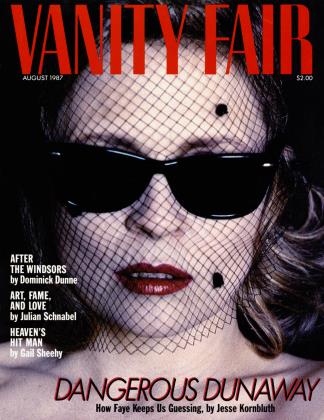Sign In to Your Account
Subscribers have complete access to the archive.
Sign In Not a Subscriber?Join NowEDITOR'S LETTER
HOLY ROLLERS
Repent, repent. Everyone in August's Vanity Fair seems to have a mission. No each bums here. They're all facing up or fessing up or communing with higher powers. It's walking, talking evidence that a new moral austerity is taking hold.
Exhibit A: Rudolph Giuliani, U.S. attorney for the Southern District of New York, whom Gail Sheehy profiles on page 88. He seems to be running for no less an office than God. In an era when heroes seem constantly on the move into the feet-of-clay department, Giuliani stays the untouchable, and he has a curiously redemptive effect on his prey. Confronted by his white monk's face, an assorted bag of Mafia dons, Wall Street fat cats, corrupt cops, grafting local pols, and drug kings feel an inexorable desire to purge themselves of their past. As one prince of the city remembers about his own act of contrition to Giuliani, "There was something special, something clean and fine, when Giuliani told you he was on your side." This makes him more than a latter-day Eliot Ness or the media-hungry careerist that his enemies portray. Sheehy paints him as a genuine Savonarola figure sent to purify the stews of corruption. Clearly he has an acute sense of sin that elevates him from being merely a heavy hitter in the game of cops and robbers. What is unique about Sheehy's portrait is her exposition of the other side of Giuliani, the man of compassion beset by anguish when he contemplates the pain his retribution causes the innocent families of wrongdoers, and the man of humility who sees the corruptions of high office: "This position has too much power. I don't want the J. Edgar Hoover syndrome to set in, where I come to believe I own the job."
Martin Sheen is another spiritual maverick. Not many movie stars turn down one hot role after another because it offends their moral code. The road to Damascus for Sheen came shortly after the filming of Apocalypse Now, when he had had a heart attack at thirty-six and found, as Stephen Schiff reports on page 114, that acting "wouldn't fill the empty spaces in his soul." Revived Catholicism, left-wing politics, and anti-nuke demonstrations have. And they have also now set him free to be a good actor, undistracted by star status. "I know if a decent part is being offered to me," says Sheen, "that means everybody else in town has already read it and turned it down. I don't give a shit."
Faye Dunaway, profiled on page 94 by V.F.'s newest contributing editor, Jesse Kombluth, has had no such clear epiphany as Sheen. She has had to haul her talent back from a debilitating series of bad career moves and damaging behavior patterns that threatened to send her on a solitary cruise down Sunset Boulevard. Now she is fighting to get back on top, and it's starting to look good. Her new appearance is in a minor movie, Barfly, but it garnered critical raves at Cannes, and she is set to star opposite that intellectual sex symbol Klaus Maria Brandauer in Burning Secret. Has naughtiness really been replaced by Nautilus or is there some residual bad girl left in Faye? I am happy to tell you that piety is not yet her problem, and at forty-six she has never looked more dangerously alluring than when she posed for our photographs by Helmut Newton.
Has the spirit also moved Julian Schnabel, the enfant terrible of the art world? He has been leading with his chin from the moment he smashed his first plate, stuck it on a canvas, and smeared it with pink dental plaster. He played the role of the artist as rock star—bratty, sexy, and unacceptably rich. Now he is on the eve of a retrospective at the Whitney Museum of American Art and has written his memoirs at the ripe old age of thirty-five. They are a sort of art-world Advertisements for Myself. You will love the extracts on page 106. What has not emerged before from the Schnabel persona is the sheer exuberant humor of the man, or that he is willing to laugh at himself as well as the world. Perhaps he, too, is growing up.
Finally, on page 130, Patricia Bosworth, biographer of Diane Arbus, asks why the Hollywood hills are alive with the sound of chanting. Why people who you think have everything are trying to lose themselves in New Age religion— and find themselves prisoners of zendos. Actress Marsha Mason claims her guru very much improved her former husband Neil Simon's tennis game. She also says she only achieved total happiness watching guru Baba feed his deer and peacocks in downtown India.
Bless you,
Editor in chief
 View Full Issue
View Full Issue












Subscribers have complete access to the archive.
Sign In Not a Subscriber?Join Now